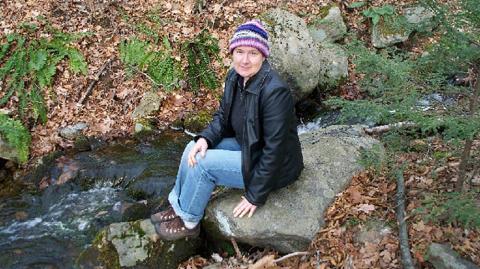
Sasha Adkins, author of From Disposable Culture to Disposable People: The Unintended Consequences of Plastics, is a lecturer at the Institute of Environmental Sustainability at Loyola University in Chicago.
Posts By This Author
Plastic and the State of Our Souls
SOMEHOW, THE CULTURAL narrative around plastics has collapsed into a story of unfortunate sea creatures with their little bellies full of plastic. As an only child who grew up living aboard a sailboat, these sea creatures are my family and the ocean is my home. I devoted my dissertation research to studying how some types of plastic marine debris concentrate methyl mercury. I crewed on a short research trip to Baja California with Capt. Charles Moore of the Algalita Marine Research Foundation, who was the first to bring attention to the Pacific “garbage patch.” I helped dissect a juvenile black-footed albatross and counted the bits of plastic in its majestic body.
I, too, feel the urgency to keep plastics out of the oceans at all costs, but I fear that there is another story that is not being told.
Disposable plastic is toxic not only to the body but also to the soul. The more we normalize short-term utility as the main criterion for evaluating the things around us, the more disconnected we become from a sense of the inherent worth of creation. The more we cultivate this habit of the heart of seeing things as disposable once they no longer serve us, the less able we are to find the beauty and value in our relationships with each other, or even the intrinsic value in ourselves once we are no longer “productive.”
Plastic’s circular economy
WHEN WE ASK, “Does this spark joy?” what if we also ask whether it “sparks joy” for the workers who make it?
Certain diseases are found almost exclusively in workers involved in the production of vinyl (polyvinyl chloride, or PVC). One is angiosarcoma (cancer) of the liver. Another is occupational acroosteolysis, a painful condition in which the bones in the fingertips break down and the minerals are reabsorbed. Thus, in a sad twist of irony, these workers are more likely to need the PVC IV tubing, PVC catheters, and PVC feeding tubes that they helped create, and they are more likely to spend time confined in hospitals, staring at vinyl walls and vinyl floors and vinyl windows.
Industry spokespeople reassure us that the levels that workers are exposed to today are much lower than they were when these links were established, but I am not sure that is true in China or in other emerging economies where much of our plastic originates.
The building blocks of PVC are derived from oil or gas. In another strange twist, tiny particles of plastic and plastic-coated sand are often used in the fracking process for extracting natural gas, some of which will then become more plastic. This is not what I mean when I advocate for a “circular economy.”
Fracking is contentious. Each pound of conventional plastic costs 22 gallons of fresh water. The amount of water required in routine fracking operations, by some estimates, is up to 9.6 million gallons per well. That does not include spills or seepage into the water table that obligates local residents to drink from yet more plastic bottles.
Do Fish Need My Ibuprofen?
It's important for me to think about water as belonging to God.
Sympathy and Clarity
Reading Joel Hunter's "Civility Is Only a Beginning" (March 2011), I was struck by the contrast between his beautifully stated intention -- "Let's listen so well that we can state others' cases in
Nestling for the Planet
The April issue of Sojourners magazine takes on climate change denial. One challenge is that the truth is hard to face -- but, as scientist Sasha Adkins describes from personal experience, one strategy is to draw inspiration from the comforts of home.
The question that I am most often asked when I talk about my Ph.D. research on the impacts of pollution has nothing to do with my methodology or my data. It is, "How do you live with this knowledge? Where do you find your hope?" It's a good question. My research results on the impact of plastics on human health and the environment are often quite demoralizing to hear. More than once when I am presenting them, an audience member has literally started to cry.
I took a year off from my environmental studies program to search for the answer to that very question, to find hope -- but this time, instead of turning to peer-reviewed journals for answers, I turned to my cats. I asked them if they would be willing to try living without fossil-fuel heat for the winter.
